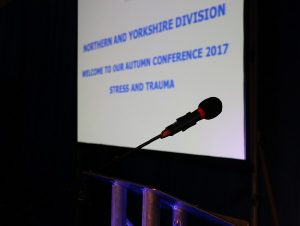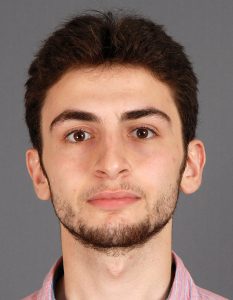29 September 2017 saw the Royal College of Psychiatrists’ (RCPysch) Northern and Yorkshire Division Autumn Conference on Stress and Trauma. Delegates from around the UK gathered in York to take part in the proceedings: the conference aimed to cover the topic of stress and trauma amongst different age groups and in a range of clinical settings.
 The first speaker was Professor Patricia Casey, director of the self-harm service at the Mater Misericordiae University Hospital in Dublin and author of the upcoming book ‘Adjustment Disorder: From Controversy to Clinical Practice’. Professor Casey kicked off the conference with an update on the latest developments in our understanding of adjustment disorders (AD), including definition changes in the upcoming ICD-11 diagnostic handbook. Current ICD and DSM criteria exclude AD if the subthreshold criterion of another condition is met, such as the two-week duration for major depression. Consequently, structured diagnostic interviews based solely on defined symptom quantity and duration, underdiagnose AD in favour of other disorders 1. Such misdiagnoses may affect a patient’s self-image, lead to unnecessary prescriptions, and impact service costing. To address this issue, expert clinical skills are required to ascertain the significance of the stressor and the symptoms in context of cultural norms. In an attempt to address this, ICD-11 will give AD full syndromal status and specify particular symptom clusters within it, such as impaired function resulting from intrusive preoccupation and inability to adapt to the stressor. However, this move will widen the differences between ICD-11 and DSM-5 possibly leading to different ‘AD populations’. Even with its diagnostic challenges, AD is the seventh commonest diagnosis made by psychiatrists2 and it is more prevalent than mood disorders amongst obstetric patients 3. As for treatment, there is a lack of evidence supporting use of antidepressants, which may be in part due to AD’s self-limiting nature, yet antidepressant use for the condition is on the rise. There is also limited evidence supporting brief psychological interventions in sub-populations of AD patients.
The first speaker was Professor Patricia Casey, director of the self-harm service at the Mater Misericordiae University Hospital in Dublin and author of the upcoming book ‘Adjustment Disorder: From Controversy to Clinical Practice’. Professor Casey kicked off the conference with an update on the latest developments in our understanding of adjustment disorders (AD), including definition changes in the upcoming ICD-11 diagnostic handbook. Current ICD and DSM criteria exclude AD if the subthreshold criterion of another condition is met, such as the two-week duration for major depression. Consequently, structured diagnostic interviews based solely on defined symptom quantity and duration, underdiagnose AD in favour of other disorders 1. Such misdiagnoses may affect a patient’s self-image, lead to unnecessary prescriptions, and impact service costing. To address this issue, expert clinical skills are required to ascertain the significance of the stressor and the symptoms in context of cultural norms. In an attempt to address this, ICD-11 will give AD full syndromal status and specify particular symptom clusters within it, such as impaired function resulting from intrusive preoccupation and inability to adapt to the stressor. However, this move will widen the differences between ICD-11 and DSM-5 possibly leading to different ‘AD populations’. Even with its diagnostic challenges, AD is the seventh commonest diagnosis made by psychiatrists2 and it is more prevalent than mood disorders amongst obstetric patients 3. As for treatment, there is a lack of evidence supporting use of antidepressants, which may be in part due to AD’s self-limiting nature, yet antidepressant use for the condition is on the rise. There is also limited evidence supporting brief psychological interventions in sub-populations of AD patients.
Dr Melanie Temple, Clinical Lead for The Kemp Unit in York (a specialist inpatient service for women with complex post-traumatic stress disorder (PTSD) and dissociative presentations), gave a presentation on Complex Dissociative Disorders. Severe dissociative disorders are as prevalent as schizophrenia and bipolar disorders yet are unequally covered in curricula. Dissociation itself is natural and universal to everyone, like ‘switching off’ during repetitive tasks and long journeys. In other cases, it is an adaptive response to distressing and possibly life-threatening events allowing individuals to focus on resolving the situation such as physical escaping if possible. Severe dissociation occurs when the brain is overwhelmed by fear or powerlessness, or when there is no escape. If dissociation is relied upon through multiple traumas, especially in childhood, then the developing brain may not develop other adaptive responses. As a result, experiences and identity become so fragmented that an individual may function without being aware of their environment or even their own actions. Clinically, an individual may only display one ‘functional state’ leading to a misdiagnosis of personality disorders, but quite often a question regarding amnesia of experience may shed light on any dissociation. A correct diagnosis is of course important for appropriate treatment and follow up. For those interested, I would recommend reading about the ‘Structural Dissociation Model’ which Dr Temple used to explain the condition further.
 Delivering the talk about trauma in children was Dr Lisa Rippon, Consultant Psychiatrist for Children and Young People with intellectual disabilities. Dr Rippon described how no two children have the same experience or reaction to trauma and that whilst most are resilient, they still all need to be safeguarded to avoid further harm. Other than the direct physical and emotional harm that trauma and neglect can inflict, they can also cause epigenetic changes too, contributing to long-term chronic consequences such as Ischaemic Heart Disease. I found it shocking to learn that the prevalence of neglect almost trebles from 5% in those under 11 to 13% in those between 11-17 years, with nearly half of all children at risk of sexual exploitation being aged 16-17 years; however, laws do not offer them the same level of protection as their younger peers.
Delivering the talk about trauma in children was Dr Lisa Rippon, Consultant Psychiatrist for Children and Young People with intellectual disabilities. Dr Rippon described how no two children have the same experience or reaction to trauma and that whilst most are resilient, they still all need to be safeguarded to avoid further harm. Other than the direct physical and emotional harm that trauma and neglect can inflict, they can also cause epigenetic changes too, contributing to long-term chronic consequences such as Ischaemic Heart Disease. I found it shocking to learn that the prevalence of neglect almost trebles from 5% in those under 11 to 13% in those between 11-17 years, with nearly half of all children at risk of sexual exploitation being aged 16-17 years; however, laws do not offer them the same level of protection as their younger peers.
There were many other interesting presentations throughout the day. Notably, Mathew Cole, psychotherapist and Eye Movement Desensitisation and Reprocessing therapy (EMDR) consultant, shared an overview of cognitive behavioural therapy (CBT) and EMDR use and some case studies highlighting their application in a variety of problems from addressing anxiety to treating PTSD in veterans. Amongst the presentations there was a workshop titled ‘Work Well’ following on from the Royal College’s Start Well initiative of 2014, aimed at assisting newly qualified psychiatrists with their transition into the speciality. During the workshop, consultants and trainees reflected on their training and career plans as well as their management of stress. With the retirement age being pushed back for many, there was shared sentiment to ‘live well’ by enjoying life’s pleasures alongside work and hopefully avoiding burn out. This is certainly an issue that is relevant to the entire medical workforce, including medical students.
To summarise, this conference covered a variety of trauma and stress related disorder presentations. These disorders extended beyond the few conditions the public might commonly associate with trauma, such as PTSD. It was interesting to hear how definitions and management of some disorders are changing as our knowledge of them evolves. I enjoyed hearing the frank discussions amongst the attendees about the work culture and ethic which revealed a lot of compassion and enthusiasm for the field. This conference succeeded in being informative and beneficial to anyone considering a career in psychiatry or anyone interested in broadening their knowledge of mental health.
A promotional video from the Autumn Conference 2017 can be found here.
Tickets are now available for the RCPsych Northern and Yorkshire Division Spring 2018 meeting: Sex and Psychiatry.
References:
-
- Taggart C, O’Grady J, Stevenson M, Hand E, McClelland R, Kelly C. Accuracy of diagnosis at routine psychiatric assessment in patients presenting to an accident and emergency department. General Hospital Psychiatry 2006;28(4):330-5.
- Reed G, Correia J, Esparza P, Saxena S, Maj, M. The WPA-WHO Global Survey of Psychiatrists’ Attitudes Towards Mental Disorders Classification. World Psychiatry 2011; 10(2):118-131.
- Rigatelli M, Galeazzi GM, Palmieri G. Consultation-liaison psychiatry in obstetrics and gynaecology. Journal of Psychosomatic Obstetrics and Gynaecology 2002;23(3):165-72.
 Nour Alwaa is a fourth year medical student at HYMS with an interest in psychiatry and public health. He led setting up the OpenMinds volunteer project in York and Hull to deliver workshops on mental health in local secondary schools. Aside to uni he likes reading and cycling.
Nour Alwaa is a fourth year medical student at HYMS with an interest in psychiatry and public health. He led setting up the OpenMinds volunteer project in York and Hull to deliver workshops on mental health in local secondary schools. Aside to uni he likes reading and cycling.

